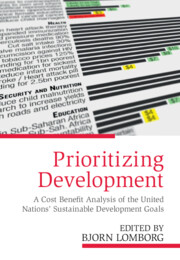Crossref Citations
This Book has been
cited by the following publications. This list is generated based on data provided by Crossref.
Lane, Jan-Erik
2020.
Global warming images.
Journal of Psychology & Clinical Psychiatry,
Vol. 11,
Issue. 1,
p.
12.
Bloom, David E.
Khoury, Alex
Kufenko, Vadim
and
Prettner, Klaus
2021.
Spurring Economic Growth through Human Development: Research Results and Guidance for Policymakers.
Population and Development Review,
Vol. 47,
Issue. 2,
p.
377.
Ghecham, Mahieddine Adnan
2022.
The Impact of COVID-19 on Economic Growth of Countries: What Role Has Income Inequality in It?.
Economies,
Vol. 10,
Issue. 7,
p.
158.
Giuliodori, Andrea
Berrone, Pascual
and
Ricart, Joan Enric
2023.
Where smart meets sustainability: The role of Smart Governance in achieving the Sustainable Development Goals in cities.
BRQ Business Research Quarterly,
Vol. 26,
Issue. 1,
p.
27.
Williams, Trenton Alma
Nason, Robert
Wolfe, Marcus T.
and
Short, Jeremy C.
2023.
Seizing the moment—Strategy, social entrepreneurship, and the pursuit of impact.
Strategic Entrepreneurship Journal,
Vol. 17,
Issue. 1,
p.
3.
Speidel, J. Joseph
and
O’Sullivan, Jane N.
2023.
Advancing the Welfare of People and the Planet with a Common Agenda for Reproductive Justice, Population, and the Environment.
World,
Vol. 4,
Issue. 2,
p.
259.
O’Sullivan, Jane N.
2023.
Demographic Delusions: World Population Growth Is Exceeding Most Projections and Jeopardising Scenarios for Sustainable Futures.
World,
Vol. 4,
Issue. 3,
p.
545.
Grodzicki, Tomasz
2023.
Sustainable development in western Balkan countries: an analysis of decent work and economic growth.
Spatium,
p.
66.
Lomborg, Bjorn
2023.
Save 4.2 Million Lives and Generate $1.1 Trillion in Economic Benefits for Only $41 Billion: Introduction to the Special Issue on the Most Efficient Policies for the Sustainable Development Goals.
Journal of Benefit-Cost Analysis,
Vol. 14,
Issue. S1,
p.
1.
Gönültaş, Yasin Can
2024.
Ekolojik perspektiften teorik bir inceleme: Sürdürülebilir kalkınma bir retorik mi?.
Nevşehir Hacı Bektaş Veli Üniversitesi SBE Dergisi,
Vol. 14,
Issue. 3,
p.
1692.



